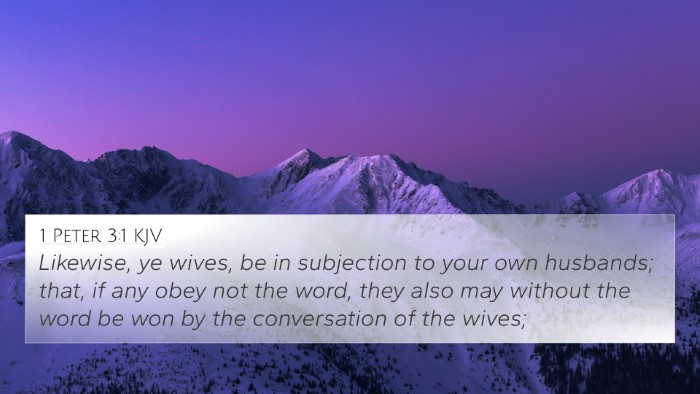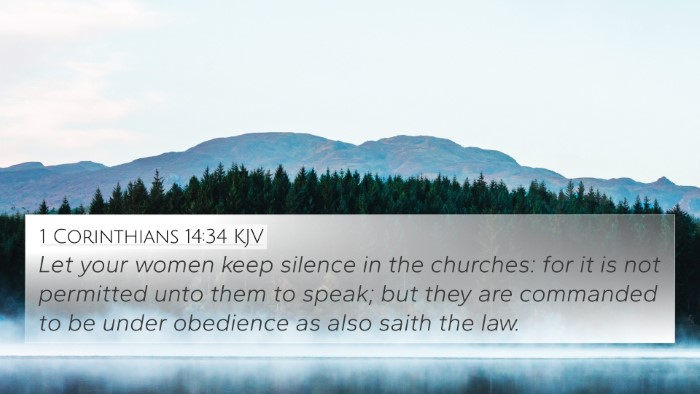Understanding Ephesians 5:22
Ephesians 5:22 states: "Wives, submit yourselves unto your own husbands, as unto the Lord." This verse has been a subject of much discussion and interpretation within Christian communities.
Summary of Meaning
This verse instructs wives to submit to their husbands in a manner that parallels their submission to the Lord. Various public domain commentaries provide insight into the intricacies of this directive.
Commentary Insights
- Matthew Henry: He highlights the importance of mutual respect in marriage. Henry emphasizes that the submission here is a voluntary act of love, reflecting the relationship between Christ and the Church. It should not be seen as oppression but as a harmonious partnership where both parties serve each other.
- Albert Barnes: Barnes notes that this verse must be viewed in the context of the following verses, where love and respect are reciprocated. He explains that the instruction does not imply inferiority but rather a God-ordained structure for family relationships that fosters peace and order.
- Adam Clarke: Clarke delves into the theological implications, stressing the divine order of authority. He suggests that submission must be understood within the covenant of marriage, which was established by God, thus making the relationship sacred and fundamental for the stability of society.
Biblical Cross-References
To enrich the understanding of Ephesians 5:22, several Bible verses that relate to this instruction can be considered:
- Colossians 3:18: "Wives, submit yourselves unto your own husbands, as it is fit in the Lord." This reinforces the principle laid out in Ephesians.
- 1 Peter 3:1: "Likewise, ye wives, be in subjection to your own husbands." This verse highlights the beauty of a respectful relationship.
- Genesis 2:18: "It is not good that the man should be alone; I will make him a help meet for him." Establishing the intended partnership in marriage.
- Ephesians 5:21: "Submitting yourselves one to another in the fear of God." This context shows the mutual submission principle that balances the directive to wives.
- Titus 2:5: "To be discreet, chaste, keepers at home, good, obedient to their own husbands." Provides a similar directive that aligns with Paul’s teachings.
- 1 Corinthians 11:3: "But I would have you know, that the head of every man is Christ; and the head of the woman is the man; and the head of Christ is God." This verse discusses the divine order in relationships.
- Proverbs 31:10-31: The virtuous woman exemplifies qualities that complement submission, highlighting strength and dignity.
Thematic Connections
In studying this verse, it is helpful to recognize the thematic Bible verse connections that shed light on the character of Christian marriage.
- Christian love and respect: This theme recurs throughout scripture, helping to underscore the depth of marital relationships.
- Authority and order: The concept of divine authority is present in various passages, fostering an understanding of peace and organization in family units.
- Mutual support: The idea that both spouses are called to support one another is paramount, especially evident in the teachings of Jesus regarding love.
Practical Applications and Tools
For those studying this verse further, various tools for Bible cross-referencing can significantly enhance understanding:
- Using a Bible concordance can guide readers to related passages.
- A cross-reference Bible study can reveal thematic elements linking various scriptures.
- Employing a Bible cross-reference guide allows for deeper exploration of marital principles.
- Launching a Bible chain reference study can show the interconnectedness of biblical teachings on submission and authority.
Conclusion
In summary, Ephesians 5:22 calls for a form of submission rooted in love and respect, paralleling the relationship between Christ and His Church. Understanding this verse through various commentaries and cross-references enriches our grasp of its implications in Christian life and the sanctity of marriage.











